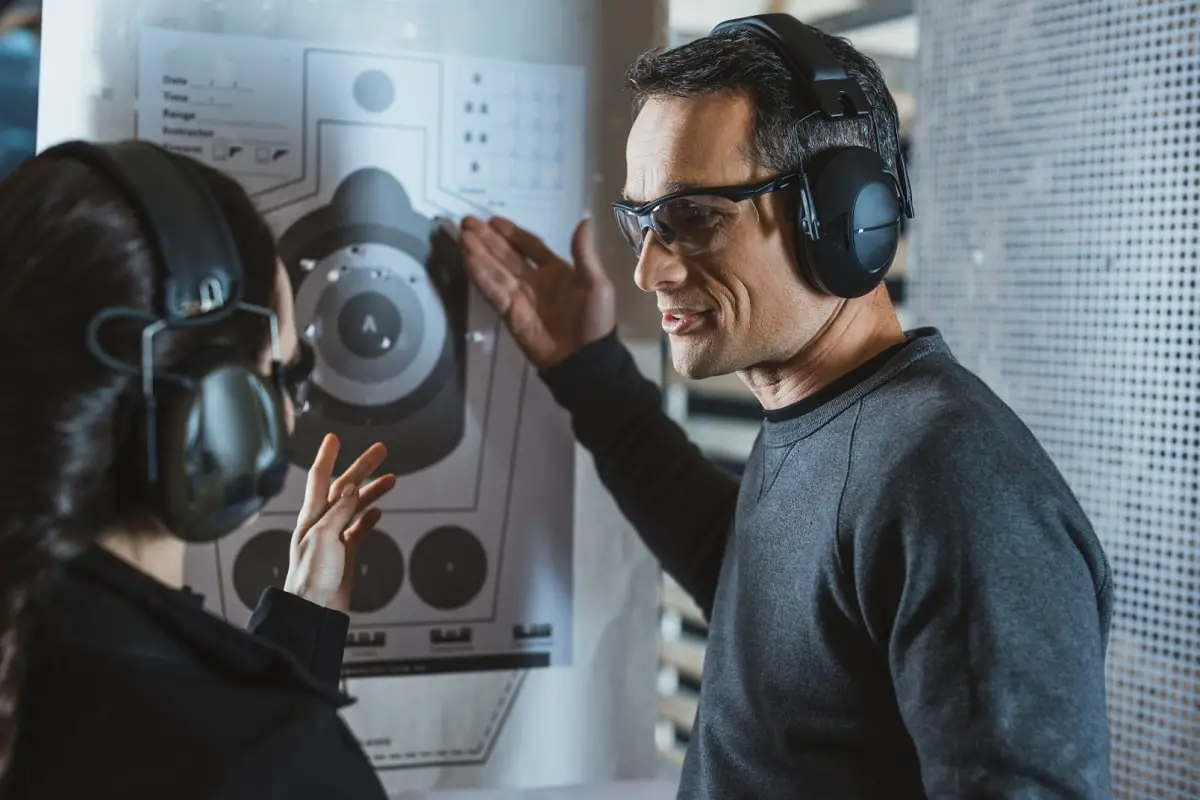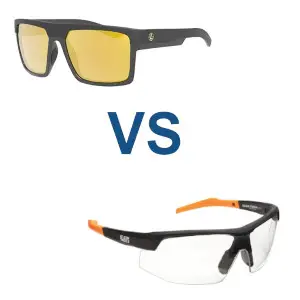Whether you use firearms for practice, sport, or hunting, equipping yourself with safety gear is crucial, and that also includes having a pair of quality shooting glasses. Shooting glasses can protect you from ricochet shots and debris, as well as shot emissions like flames, dust and burning powder.
How do shooting glasses compare to standard safety glasses? More importantly, will standard work safety glasses protect you from eye injuries while shooting?
Similarities Between Shooting Glasses and Safety Glasses
Proper eye protection is the key to a safe and enjoyable shooting experience, which is why most people who have a firearm also go for either shooting glasses or safety glasses. Let’s see how they’re similar before talking about their differences.
First, both shooting glasses and safety glasses have a similar appearance, so you might not be able to spot the difference until you go into the details.
Moreover, both types of glasses are highly durable and much stronger than your average prescription or sun glasses. Both glasses are designed to keep your eyes safe where there are flying objects or debris in the air.
Also, both shooting and safety glasses must comply with specific ANSI safety ratings, which we’ll discuss in the next section in detail.

Looking for shooting glasses? Here are some highly rated ones to check out:
Smith & Wesson M&P Thunderbolt Full Frame Shooting Glasses
Walker’s Sport High-Grade Polycarbonate Adjustable Shooting Glasses
Ducks Unlimited Eye Protection Shooting Glasses With 5 Anti-Fog Lens Options
As an Amazon Associate, SelectSafety earns commissions from qualifying purchases made through links in this post.
Differences Between Shooting Glasses and Safety Glasses
Now that we’ve gone over the similarities, let’s check out the numerous differences that you can find between shooting glasses and safety glasses.
The first difference between the two is in the way you use them. As the name suggests, shooting glasses are specially designed for use while shooting a firearm. In contrast, safety glasses are used for industrial settings and work with small flying debris that can injure your eyes.
While the two types of glasses can sometimes be used interchangeably, there are various differences in their construction.
Shooting glasses and safety glasses have different safety ratings, determined by the American National Standards Institute (ANSI). Shooting glasses have the highest ANSI standards and undergo extensive testing for ballistic resistance and high-velocity impacts. On the other hand, safety glasses are mostly tested for durability against small impacts and scratches, and that’s it.
Another major difference between the two is in the types of lenses that they have. Shooting glasses have lenses that are much more durable and tested for maximum impact. Moreover, they’re also available in various tints instead of just colorless, so you get various options to choose from.
On the other hand, safety glasses are normally colorless, and their lenses aren’t as durable, mainly because their purpose is to protect against small flying debris or dust.
Are Z87 Glasses Good For Shooting?
Yes, Z87.1+ rated glasses are safer to wear for shooting than those that do not meet this rating. Z87 glasses are rated by The American National Standards Institute (ANSI) and undergo extensive testing to make sure they can withstand high-impacts, radiation, chemicals, flammables, and corrosion.
All shooting glasses or safety glasses intended to be used for shooting need to meet this standard at minimum. However, for the best protection, it is recommended to wear shooting glasses that meet the all of the highest standards for the risks associated with shooting firearms. This can also include safety performance ratings issued by the military (US MIL-PRF).
For more information, see our post Shooting Eye Protection: Shooting Glasses Safety Standards.
What to Look for In Shooting Glasses?
You can keep in mind certain factors while choosing shooting glasses for the shooting range or your next hunting trip. Let’s go over them one by one.
First and foremost, the material of the lens is very important, as it should be durable enough to withstand the impact of a firearm when you experience recoil. Most companies use polycarbonate lenses, which are highly durable and lightweight, so they also don’t feel heavy on your face.
Moreover, lens color also matters, which is why you see high-performance shooters wearing yellow or amber-colored shooting glasses. Not only does it protect their eyes and give them the proper vision they need to make a shot, but it also protects their eyes against glare from the sun.
The type of frame you choose is also key to your shooting performance and safety. Like your lenses, the frames should also be lightweight, and you can choose between materials like aluminum, plastic, or titanium. A lighter frame means more comfortable wear and optimum shooting performance.
If you have weak eyesight and have been prescribed lenses by your optician, you can also opt for special shooting glasses with prescription lenses. This way, you won’t put any strain on your eyes when shooting.
Last but not least, make sure to check the safety ratings of any shooting glasses before buying. Z87.1+ rated glasses are safer. As we mentioned above, each one of them comes with different ratings, which makes them different in how they’re tested for safety and impact resistance.
Which One Is Best for Shooting Safety?
When comparing shooting glasses to safety glasses, the former is a clear winner by a mile because not only do they provide superior impact resistance and durability, but shooting glasses can also be used as safety glasses.
For instance, if you have a pair of shooting glasses and you’re working with a power saw and cutting wood, you can simply pop on your shooting glasses and get to work.
The converse is also true – you can use your safety glasses while you’re at the shooting range or out hunting. However, safety glasses won’t provide you with the same level of protection as shooting glasses because these are simply designed for stopping any type of debris going into your eyes while you’re doing any industrial work.
So, if you’re a firearm enthusiast, investing in a good pair of shooting glasses is a wise decision that you’ll make, especially if you don’t want to end up with a black eye due to the strong recoil by a shotgun or hunting rifle!
We hope this article helps you understand the difference between shooting glasses and safety glasses and also enables you to choose the best shooting glasses from the hundreds of models available in the market.

